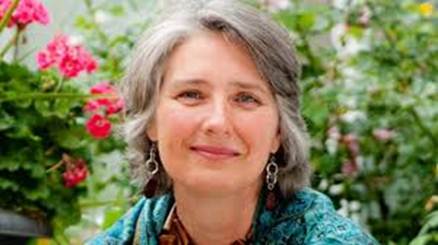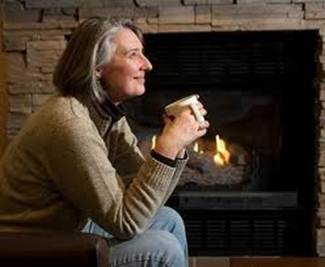
It takes courage, talent, and luck to
reinvent yourself at mid-life. Louise Penny has plenty of all three.
“I have been lucky in my life in many,
many ways”, she says. “And I think I was very lucky in my mid-30s. I really had
to evaluate where I was and if it was where I wanted to be. And I realized it
wasn’t. I wasn’t even halfway through my life and something had to change.”
Penny had built a successful
career in
broadcasting, hosting popular local programs on CBC Radio, first in
Thunder Bay, then in Winnipeg, Quebec City, and finally Montreal. She
speaks frankly,
looking back.
“There are many people who have great
careers in the media because they thrive in that atmosphere. But I didn’t. I
needed something else.”
As a child she dreamt of creating
novels
that would be widely read, showered with critical praise, eagerly
anticipated
by fans. And, in her middle years, that has become the bestselling
author’s
reality. In less than a decade, Penny has become one of Canada’s most
successful writers. She has sold over a million copies of her seven
books. Her latest,
A Trick of the Light (St. Martin’s Press, September 2011),debuted at
number four on the prestigious New York Times bestseller list. She’s won
a bushel of awards for her writing (including four consecutive Agathas for Best
Novel in the spirit of Agatha Christie). Her fans are ardent, and her
reputation is glowing.
In conversation from her city home in Montreal, she speaks often of her winding, difficult road to reach this place:
“I tried to write early in life and
couldn’t. And in retrospect now I realize I was trying to write for the wrong
reasons. I was trying to write so that I would have success and the applause
and approval of the outside world. And the reality was, I had very little to
say. I was quite callow. I was one of those people who really had to live fully
and experience.”
Discovering Discipline

Penny was born in Toronto in 1958 and
raised there in the leafy Lawrence Park neighbourhood, a middle child with two
brothers. Her love of words came naturally. “My mother instilled,” she recalls,
“as my grandfather did, a great love of poetry.” Her father, John Penny, an
investment dealer, ”loved reciting poetry and singing Harry Belafonte.”
John Penny died when Louise was 18. she
remembers him as “a man of his time; he wasn’t always as warm and as present;
he was busy building his own career. We weren’t a family that went around
camping or on vacations together. It was later my brothers and I discovered how
much we loved each other.”
A high school star in basketball and
volleyball, Penny was Athlete of the year at Lawrence Park Collegiate, but, she
says, “I was not one of those popular kids. I remember it being just a terrible
time. I was overweight; I was, I think, socially maladroit. Athlete of Year but
I always felt like a mental idiot.”
She backed into media accepting
an
invitation to cover high school sports for Toronto newspapers, then went
on to
study broadcasting. She joined CBC Radio, eventually relocating to
Thunder Bay and carrying plenty of unhappiness and attitude. Penny
summed up her brittle
young self to Canada’s Quill and Quire:
“I was very cynical, very bitter, the
sort of person who, when I joined the CBC, I hoped I wouldn’t have to work
with. Well, I wasn’t just working with her. I was her. I try very hard now to
be a decent human being because I’ve been an indecent one, and I know the
difference.”
She still cringes, recalling her arrival
at Lakehead:
“I remember showing up in Thunder
Bay I think I was 20 to 21 or 21 to co-host the morning show and of
course I was
going to teach them all how it should be done. And I’m horrified at the
thought
of it. I was so arrogant, so full of myself. And how everybody put up
with me,
and didn’t just cut me up in little pieces and throw me over Kakabeka
Falls… But I learned a certain humility, and that smart, thoughtful,
kind people live
outside of big cities. I spent a lot of my life… not dismissing
kindness, but
not thinking about it, about what a great gift it is.”
She rose in her career, but her
unhappiness isolated her. Among her memories, she recalls “despair and just dreadful
echoing loneliness that brought me to my knees.” Finally, at age 35, she
realized she had to change. “I’m a recovering alcoholic,” she says evenly.
“It’s not something I talk and has been sober for nearly 20 years, still
practising a recovery program.
As she reinvented herself, she also
found her luck. Fate and a blind date brought her something unexpected love,
and a man she calls her soulmate. Happily married to Dr. Michael Whitehead, a
widower and head of haematology at Montreal Children’s Hospital, she left
broadcasting in 1996, free to create at last:
“I thought, ‘Oh finally, the free spirit
that is natural to me will come out. I am no longer imprison